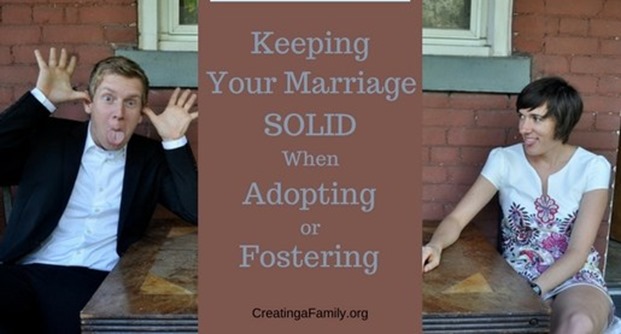Showing posts with label parenting. Show all posts
Showing posts with label parenting. Show all posts
Sunday, December 2, 2018
Tuesday, April 3, 2018
Keeping Your Marriage Solid When Adopting or Fostering by Creating A Family
Source: https://creatingafamily.org/
“One of the wisest pieces of advice I received as a new parent was the following: The greatest gift you can give your child is a healthy and happy relationship with your spouse. Four kids later all I can add is a loud “AMEN”!” by Creating A Family. #SaveAdoptions
It is so easy in the thralls of new parenthood to be completely obsessed with your new baby or child. It is also pretty common to be completely overwhelmed by the demands of new motherhood/fatherhood. This is the case regardless whether you adopt a newborn, a 6 year old, or foster a sibling group of 3. Parenthood can be all-consuming if we let it. I’m suggesting that you don’t let it consume your marriage.
Parenting is a Marathon, not a Sprint!
You’re going to be parents for a LONG time. Even when your kids are grown and have flown the nest, you will still be parenting. It’s easy to forget this at the beginning. When asked in the Creating a Family Facebook Support Group what they were doing to find time for their marriage, we heard the following:
- Not Much. But we’re older parents and I guess we had time before to ourselves so we’re kind of ok with all family time. We go out maybe every 6 weeks or so. We’ve kind of turned more into best friends and partners in crime but we’re ok with that.
- We are fostering and parenting and all our time and energy are going to the kids. I feel like we give each other only our leftovers. And lately neither of us have much left over. We know we need to do something about it, but just don’t have the energy or time to do it.
- We don’t. DH and I are lacking. We try to have alone time in the car or at 2 am, but it’s hard.
For the record, alone time when you are passing in the hallway at 2:00 am does not count!
Monday, September 4, 2017
The Scariest Special Need of All—Would You Adopt This Child?
Source: https://creatingafamily.org
By Dawn Davenport
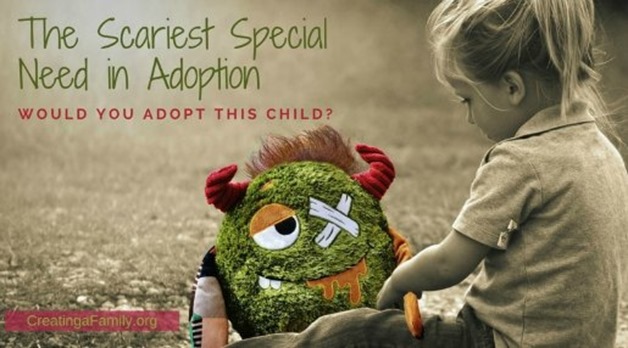
In my experience there is one special need that scares prospective adoptive parents the most. The one where even parents who have a wide range of acceptance for special needs will often say “no”. The special need that is preventing thousands of children from being adopted. That special need is being the victim of sexual abuse. Yes, that special need is actually being the victim of abuse!
Through no fault of their own these children have been sexually abused and are now being victimized again by the near universal fear of raising a child that has been sexually abused. Irony anyone?
I have been told by countless social worker that if the child has a record of sexual abuse in their file or a record of showing the symptoms of having been sexually abused, the chances of finding an adoptive family becomes infinitely harder. This breaks my heart.
Continue reading.
By Dawn Davenport

In my experience there is one special need that scares prospective adoptive parents the most. The one where even parents who have a wide range of acceptance for special needs will often say “no”. The special need that is preventing thousands of children from being adopted. That special need is being the victim of sexual abuse. Yes, that special need is actually being the victim of abuse!
Through no fault of their own these children have been sexually abused and are now being victimized again by the near universal fear of raising a child that has been sexually abused. Irony anyone?
I have been told by countless social worker that if the child has a record of sexual abuse in their file or a record of showing the symptoms of having been sexually abused, the chances of finding an adoptive family becomes infinitely harder. This breaks my heart.
Continue reading.
Sunday, June 11, 2017
3 Reasons Traditional Parenting Doesn’t Work with Kids from Trauma by Mike Berry
Source: http://www.rainbowkids.com
The following article was graciously shared, with permission, by Mike Berry from the blog Confessions of an Adoptive Parent.
 If
you’ve parented a child from a traumatic past for any length of time,
you already know that traditional parenting techniques do not work. But,
have you ever stopped to consider why, or what you could do
differently?
If
you’ve parented a child from a traumatic past for any length of time,
you already know that traditional parenting techniques do not work. But,
have you ever stopped to consider why, or what you could do
differently?
Kristin and I both grew up in traditional households, with parents who used traditional techniques in raising us both. There were rules and restrictions, guidelines and boundaries. And if said rules, restrictions, guidelines and boundaries were crossed, BAM, consequences were enforced. No questions asked. From all accounts, these techniques worked. We both grew up to be responsible adults who knew the difference between right and wrong. But, we also never endured significant trauma as children.
Continue reading.
The following article was graciously shared, with permission, by Mike Berry from the blog Confessions of an Adoptive Parent.
 If
you’ve parented a child from a traumatic past for any length of time,
you already know that traditional parenting techniques do not work. But,
have you ever stopped to consider why, or what you could do
differently?
If
you’ve parented a child from a traumatic past for any length of time,
you already know that traditional parenting techniques do not work. But,
have you ever stopped to consider why, or what you could do
differently?Kristin and I both grew up in traditional households, with parents who used traditional techniques in raising us both. There were rules and restrictions, guidelines and boundaries. And if said rules, restrictions, guidelines and boundaries were crossed, BAM, consequences were enforced. No questions asked. From all accounts, these techniques worked. We both grew up to be responsible adults who knew the difference between right and wrong. But, we also never endured significant trauma as children.
Continue reading.
Thursday, June 8, 2017
Books on Toddler and Older Child Adoption for Adoptive Parents
Source: https://creatingafamily.org

Toddler Adoption: The Weaver’s Craft by Mary Hopkins-Best. Great information. The author was interviewed on the Creating a Family radio show.

Adopting Older Children: A Practical Guide to Adopting and Parenting Children Over Age Four by Stephanie Bosco-Ruggiero, MA; Gloria Russo Wassell, MS, LMHC; and Victor Groza, PhD. – This is a wonderful resource full of practical and hopeful tips for parents who have adopted a child over age four from foster care or through international adoption. The adoption therapist authors do not gloss over potential problems, but they don’t exaggerate them either. Listen to our interview with them on the Creating a Family Radio Show- Parenting Older Adopted Kids: A Practical Guide.
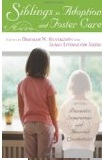
Siblings in Adoption and Foster Care: Traumatic Separations and Honored Connections by Deborah N. Silverstein and Susan Livingston Smith – This book is a comprehensive resource on issues facing siblings during foster care or adoption – both biological and adopted.
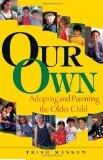
Our Own: Adopting and Parenting the Older Child by Trish Maskew

Adopting the Older Child by Claudia L. Jewett- Written in 1979 but still relevant.

Adopting a Toddler: What Size Shoes Does She Wear? by Denise Harris Hoppenhauer – Offers great insight and practical advice for those preparing to adopt a toddler.

Nurturing Adoptions – Creating Resilience after Neglect and Trauma by Deborah Gray – Anything by Deborah Gray is great. On our show she said this book was primarily written for adoption professionals, but I think adoptive parents will find a lot of useful information as well.
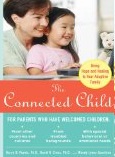
The Connected Child: Bring Hope and Healing to Your Adoptive Family by Karyn B. Purvis, David R. Cross, and Wendy Lyons Sunshine

Parenting Your Adopted Older Child By Brenda McCreight – Good overview!

Another Place at the Table by Kathy Harrison – I loved this book. It is the true life tale of one foster family and is very well written. I couldn’t put it down.
Wednesday, June 7, 2017
5 Tips for Parenting Harder to Parent Adopted Kids
Source: https://creatingafamily.org
By Dawn Davenport

Sometimes parenting feels like we are soaring. Everything is clicking—we get the kids out the door in the morning without a major tantrum and we’re no more than 10 minutes late, we are eating semi-nutritious meals most days, and the little darlings are in bed with a minimum of fuss and teeth more or less brushed most nights.
Then there are times when it feels like we are slugging it out in the trenches. Often it is one particular child that puts us there. Perhaps this child was adopted at an older age after experiencing trauma, or maybe she has brain damage caused by prenatal exposure to alcohol or drugs, or maybe this child’s temperament is a really poor match for yours. Whatever the reason, some kids are simply more challenging to parent.
When you are in the trenches it’s hard to see a way out. It’s at those times that you need some “quick” tips and tricks to help you cope. Read over these tips every week until you start to climb your way out of the parenting depths.
Read more.
By Dawn Davenport
Sometimes parenting feels like we are soaring. Everything is clicking—we get the kids out the door in the morning without a major tantrum and we’re no more than 10 minutes late, we are eating semi-nutritious meals most days, and the little darlings are in bed with a minimum of fuss and teeth more or less brushed most nights.
Then there are times when it feels like we are slugging it out in the trenches. Often it is one particular child that puts us there. Perhaps this child was adopted at an older age after experiencing trauma, or maybe she has brain damage caused by prenatal exposure to alcohol or drugs, or maybe this child’s temperament is a really poor match for yours. Whatever the reason, some kids are simply more challenging to parent.
When you are in the trenches it’s hard to see a way out. It’s at those times that you need some “quick” tips and tricks to help you cope. Read over these tips every week until you start to climb your way out of the parenting depths.
Read more.
Monday, April 3, 2017
Decoding Your Child's Behavior
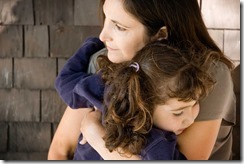 At
some point all parents face behavioral challenges with their children.
Adopted children have often had unfortunate experiences that may
increase misbehavior and make traditional discipline techniques
ineffective. Join Phyllis Booth, Founder of Theraplay®, and Mandy Jones,
LCSW, JD, certified Theraplay® therapist at the Center for Lifelong
Adoption Support, as they provide an empathetic understanding of why
negative behaviors occur and discuss tools, techniques and activities
that parents can use to tame temper tantrums and create positive
relationships.
At
some point all parents face behavioral challenges with their children.
Adopted children have often had unfortunate experiences that may
increase misbehavior and make traditional discipline techniques
ineffective. Join Phyllis Booth, Founder of Theraplay®, and Mandy Jones,
LCSW, JD, certified Theraplay® therapist at the Center for Lifelong
Adoption Support, as they provide an empathetic understanding of why
negative behaviors occur and discuss tools, techniques and activities
that parents can use to tame temper tantrums and create positive
relationships.Topics will include:
- Differences adopted children face in childhood and how that affects behavior
- Behavioral and self-regulation issues both at home and in school
- What parents can do to curb negative behaviors
- How parents can create happy, connected family relationships
Tuesday, December 13, 2016
The Kids who Need the Most Love Will Ask for it in the Most Unloving Ways by Katie Malinski
Source: http://katiemalinski.com
By Katie Malinski
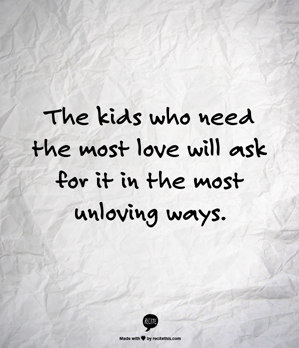 I snapped a picture of this quote on the wall at the Magellan
International School the other day, and posted it on Facebook. A week
or so later, it had been shared by 68 people, and viewed by nearly
7000. Obviously, this quote resonates for many of us.
I snapped a picture of this quote on the wall at the Magellan
International School the other day, and posted it on Facebook. A week
or so later, it had been shared by 68 people, and viewed by nearly
7000. Obviously, this quote resonates for many of us.
One of the first things I tell most parents that I work with is that behavior is a communication, and that understanding the message in a child’s behavior is incredibly helpful for changing those behaviors. To put it another way, something is behind or underneath unwanted behavior; triggering or motivating or strengthening it. Those hidden drivers are usually unmet needs of some variety. When parents can identify what those unmet needs are, they typically find that those underlying needs are needs they want to support. In other words: the behaviors are unwanted, but the needs driving those behaviors are understandable!
Continue reading.
By Katie Malinski
 I snapped a picture of this quote on the wall at the Magellan
International School the other day, and posted it on Facebook. A week
or so later, it had been shared by 68 people, and viewed by nearly
7000. Obviously, this quote resonates for many of us.
I snapped a picture of this quote on the wall at the Magellan
International School the other day, and posted it on Facebook. A week
or so later, it had been shared by 68 people, and viewed by nearly
7000. Obviously, this quote resonates for many of us.One of the first things I tell most parents that I work with is that behavior is a communication, and that understanding the message in a child’s behavior is incredibly helpful for changing those behaviors. To put it another way, something is behind or underneath unwanted behavior; triggering or motivating or strengthening it. Those hidden drivers are usually unmet needs of some variety. When parents can identify what those unmet needs are, they typically find that those underlying needs are needs they want to support. In other words: the behaviors are unwanted, but the needs driving those behaviors are understandable!
Continue reading.
Tuesday, October 4, 2016
Heart of the Matters Website and Courses are Updated and Refreshed

October 2016
Course Spotlight: Because They Waited

-
Quality: 10 hours of Hague compatible education
-
Refreshed: Renewed with updated resources
-
Convenient: Mobile access
The Because They Waited™ education system is online with modules covering topics pertinent to individuals adopting a baby or an older child, internationally or through foster care. Modules present "The Science" in a user friendly format, followed by "The Parenting" which offers concrete parenting tools. "Wrap Up and Resources" as well as study materials are also provided for each topic.
Topics covered include:
Promoting healthy brain development
Sensory processing and sensory integration
Parenting to a child’s "real age" vs. chronological age
Understanding the internal alarm
Building attachment
Race and Culture
Contact us at info@heartofthemattereducation.com for a copy of the table of contents for Because They Waited.
More quality adoption education


Heart of the Matter Education 816 246-1100
info@heartofthemattereducation.com
www.heartofthemattereducation.com
Thursday, June 9, 2016
Friday, May 27, 2016
I Love You More Than I Care If You "Like" Me
Apparently this mom has been eaves dropping in on my house – my kids
have heard this exact same speech from the beginning of time. I love
them more than to care if they ‘like’ me. This is great.
See video.
See video.
Wednesday, May 4, 2016
The Promise: Truth From The Trenches of Adoption by Christen Shepherd and Lisa Highfield
Source: www.lulu.com
 When Christen Shepherd adopted four children from foster care she
jumped into the treacherous waters of raising traumatized children.
Because of mammoth tantrums, explosive rages, destroyed rooms, and
unending grief, the Shepherds enlisted the help of a Child and Youth
Counsellor, Lisa Highfield. The Promise is a raw and compelling read. It
offers insight into the behaviors of adopted and foster children, and
gives hope to struggling parents who are at a loss after bringing
wounded children into the family.
When Christen Shepherd adopted four children from foster care she
jumped into the treacherous waters of raising traumatized children.
Because of mammoth tantrums, explosive rages, destroyed rooms, and
unending grief, the Shepherds enlisted the help of a Child and Youth
Counsellor, Lisa Highfield. The Promise is a raw and compelling read. It
offers insight into the behaviors of adopted and foster children, and
gives hope to struggling parents who are at a loss after bringing
wounded children into the family.
Learn more.
 When Christen Shepherd adopted four children from foster care she
jumped into the treacherous waters of raising traumatized children.
Because of mammoth tantrums, explosive rages, destroyed rooms, and
unending grief, the Shepherds enlisted the help of a Child and Youth
Counsellor, Lisa Highfield. The Promise is a raw and compelling read. It
offers insight into the behaviors of adopted and foster children, and
gives hope to struggling parents who are at a loss after bringing
wounded children into the family.
When Christen Shepherd adopted four children from foster care she
jumped into the treacherous waters of raising traumatized children.
Because of mammoth tantrums, explosive rages, destroyed rooms, and
unending grief, the Shepherds enlisted the help of a Child and Youth
Counsellor, Lisa Highfield. The Promise is a raw and compelling read. It
offers insight into the behaviors of adopted and foster children, and
gives hope to struggling parents who are at a loss after bringing
wounded children into the family.Learn more.
Tuesday, March 22, 2016
How To Be With A Dysregulated Child, by Robyn Gobble, LCSW
Source: www.gobbelcounseling.wordpress.com
I think I finally get it. Or at least, I’m getting it in a deeper way. In a whole-body, brain and heart, I can feel it in my bones kind of way.
In the past few weeks, I’ve have the opportunity to experience first-hand some extremely dysregulated behavior in my office. In two circumstances, I couldn’t do anything except stay calm and wait. In a third, I could have chosen a different path (the situation was a bit more contained and I had more power than in the other two circumstances, which were much more vulnerable), but didn’t. I fully embrace the truth that I am not triggered by a dysregulated child in the same way that a parent would be. I don’t feel as wary. I don’t have the same level of attachment involved, which always muddies the waters. But I think it’s because of these very facts that I was able to maintain the clarity that allowed for this profound knowing to take place.
Read more.
I think I finally get it. Or at least, I’m getting it in a deeper way. In a whole-body, brain and heart, I can feel it in my bones kind of way.
In the past few weeks, I’ve have the opportunity to experience first-hand some extremely dysregulated behavior in my office. In two circumstances, I couldn’t do anything except stay calm and wait. In a third, I could have chosen a different path (the situation was a bit more contained and I had more power than in the other two circumstances, which were much more vulnerable), but didn’t. I fully embrace the truth that I am not triggered by a dysregulated child in the same way that a parent would be. I don’t feel as wary. I don’t have the same level of attachment involved, which always muddies the waters. But I think it’s because of these very facts that I was able to maintain the clarity that allowed for this profound knowing to take place.
Read more.
Thursday, March 10, 2016
Parenting Kids with Prenatal Alcohol and Drug Exposure
Listen to Show
Wednesday, March 9, 2016
Parent to Parent: Addressing Trauma-Based Behaviors to Promote Attachment
Debbie Schugg, Kinship Center, Adoptive Parent
(LIVE) Thursday, March 17, 2016 @ 1:00pm- 2:30pm EST
Extended Access: March 18 -23, 2016
Debbie Schugg will discuss how approaching frustrating behaviors with curiosity and compassion can lead to better outcomes, greater healing, and more peace in the home. She will share strategies for interpreting behaviors, identifying the unmet needs which drive them, prioritizing the parent-child relationship, and recognizing the role of self-care in being emotionally present with our children.
Thanks to Jockey Being Family, Jockey International the first 300 registrants can receive free registration when using coupon code ATTACH at checkout.
Click here to register.
(LIVE) Thursday, March 17, 2016 @ 1:00pm- 2:30pm EST
Extended Access: March 18 -23, 2016
Debbie Schugg will discuss how approaching frustrating behaviors with curiosity and compassion can lead to better outcomes, greater healing, and more peace in the home. She will share strategies for interpreting behaviors, identifying the unmet needs which drive them, prioritizing the parent-child relationship, and recognizing the role of self-care in being emotionally present with our children.
Thanks to Jockey Being Family, Jockey International the first 300 registrants can receive free registration when using coupon code ATTACH at checkout.
Click here to register.
Tuesday, March 8, 2016
“I Feel Like a Beast, but I Don’t Love My Adopted Child” by Dawn Davenport of Creating A Family
Source: www.creatingafamily.org
We all expect to fall immediately in love with our adopted child, but what if this doesn't happen? Parents blame themselves and children suffer. What's a parent to do? Check out this week's blog for one woman's experience. Continue Reading.
We all expect to fall immediately in love with our adopted child, but what if this doesn't happen? Parents blame themselves and children suffer. What's a parent to do? Check out this week's blog for one woman's experience. Continue Reading.
Wednesday, January 27, 2016
4 REASONS PARENTING TRAUMA IS INCREDIBLY DIFFICULT by Monica The Emerging Mama
Source: http://emergingmama.com
We were well into the third year of our family’s new normal, before I had come to the realization that things really were different for us. That no, all kids really don’t do this-whatever “this” may mean at the moment-and that we were not imagining the stress. We were not imagining the frustration. It took nearly four years to accept that the challenges we were facing couldn’t simply be dealt with by working harder or doing more. It took nearly four years to come to terms with the fact that living in a family with children who have experienced early childhood trauma(s) can be an isolating, lonely, and oddly enough traumatizing endeavor, with very unique and difficult challenges. So few on the outside can understand what it’s like to live inside our walls. That is not to suggest whatever is inside our neighbor’s walls is more or less difficult, just different perhaps. Below is my imperfect attempt to give words to some of our family’s daily struggles.
Read more.
We were well into the third year of our family’s new normal, before I had come to the realization that things really were different for us. That no, all kids really don’t do this-whatever “this” may mean at the moment-and that we were not imagining the stress. We were not imagining the frustration. It took nearly four years to accept that the challenges we were facing couldn’t simply be dealt with by working harder or doing more. It took nearly four years to come to terms with the fact that living in a family with children who have experienced early childhood trauma(s) can be an isolating, lonely, and oddly enough traumatizing endeavor, with very unique and difficult challenges. So few on the outside can understand what it’s like to live inside our walls. That is not to suggest whatever is inside our neighbor’s walls is more or less difficult, just different perhaps. Below is my imperfect attempt to give words to some of our family’s daily struggles.
Read more.
Sunday, January 17, 2016
Source: https://creatingafamily.org
By Dawn Davenport
Parenthood is stressful. We love the little darlings, but they can put a major strain on the marriage. This is especially true if our child has special challenges from being exposed to alcohol or drugs during pregnancy or was adopted at an older age and carries the baggage of abuse and neglect. What’s the trick to staying happily married when adopting or fostering children from hard places.
An all too typical pattern in adoption (and in marriage in general) is for one parent to take the lead in becoming educated about adoption, the challenges, and the type of parenting these children respond to best. Often this same parent has been the “pusher” or “moving force” behind the adoption. Often this parent is the mother. This doesn’t bode well when the challenges of adopting or fostering hit.
It’s not helpful at this point to say that the non-educated, non-pusher parent (usually the father) needs to have been educated and supported before you reach this point. That ship has already sailed. So what to do when you feel your marriage fraying under the pressure of adopting or fostering a child that has experienced trauma?
I asked this question to Dr. Karyn Purvis, author of The Connected Child, and the founder and Director of the TCU Institute of Child Development on a Creating a Family Radio show about Raising and Healing Abused and Neglected Kids. In typical Dr. Purvis fashion she had some very specific and practical advice, with a few comments of my own thrown in for good measure.
By Dawn Davenport
Parenthood is stressful. We love the little darlings, but they can put a major strain on the marriage. This is especially true if our child has special challenges from being exposed to alcohol or drugs during pregnancy or was adopted at an older age and carries the baggage of abuse and neglect. What’s the trick to staying happily married when adopting or fostering children from hard places.
An all too typical pattern in adoption (and in marriage in general) is for one parent to take the lead in becoming educated about adoption, the challenges, and the type of parenting these children respond to best. Often this same parent has been the “pusher” or “moving force” behind the adoption. Often this parent is the mother. This doesn’t bode well when the challenges of adopting or fostering hit.
It’s not helpful at this point to say that the non-educated, non-pusher parent (usually the father) needs to have been educated and supported before you reach this point. That ship has already sailed. So what to do when you feel your marriage fraying under the pressure of adopting or fostering a child that has experienced trauma?
I asked this question to Dr. Karyn Purvis, author of The Connected Child, and the founder and Director of the TCU Institute of Child Development on a Creating a Family Radio show about Raising and Healing Abused and Neglected Kids. In typical Dr. Purvis fashion she had some very specific and practical advice, with a few comments of my own thrown in for good measure.
Tips For Staying Happily Married When Adopting/Fostering
- Make time for each other. It is crucial to nurture your marriage while parenting. Nurturance takes time and it takes intention. You must schedule time to be with your spouse as a spouse, rather than as a parent discussing the kids, the house, life’s problems. I believe a weekly “Date Night” may just have saved my marriage. It doesn’t have to be at night and it doesn’t have to cost money, but it does have to happen. Find time to do an activity you both enjoy and make a point to schedule time to do it on a regular basis. Dr. Purvis suggested taking a walk together regularly. Bottom line: find a way to have fun together again.
- Model what works. Rather than telling your partner how to do things, show him. If it works to improve your child’s behavior and lower his anxiety, your spouse will see it. Sometimes our words get in the way.
- Who should educate? You do have to talk about the kids, but often the not-as-involved parent feels ambushed by these conversations which are full of what needs to be done or how he isn’t doing things right. Is it possible that someone other than you would be better at helping to educate your spouse? Would he attend your child’s therapy session and hear from the therapist what works best? Would he listen to the many Creating a Family radio show/podcasts on parenting children who have been abused and neglected during his commute to work or while he works out?
- Double up on self-care. Parenting is hard work, and worrying about your marriage is even harder. You are under a lot of stress and stress makes many (all?) of us difficult to live with. You owe it to yourself and to your marriage to take care of yourself. What you need is individual to you, but for most of us includes regular exercise, enough sleep, and something to look forward to each day—a good book and time to read, a trip to Starbucks by yourself, an occasional massage, a small tub of Ben & Jerry’s Cherry Garcia, or a night out with your friends.
- Show some compassion. The biology of most mothers leads them to want to nurture their children and figure out how to meet their children’s needs. The biology of most fathers leads them to want to protect their family. The continual chaos that can happen when adopting or fostering a child who is struggling with the aftermath of abuse and neglect makes many dads feel powerless. Powerless is a lousy place to be, and many fathers just give up. Understanding the reasons why, goes a long way to lowering your frustration. [I struggled with the gender stereotyping in this piece of Dr. Purvis’s advice, but I have to admit that it rings true.]
Sunday, December 13, 2015
NEW WEBINAR: Attending to Needs, Connecting for Life: Dr. Purvis on Attachment
 Thursday, February 4, 2016, 7:00 PM CT
Thursday, February 4, 2016, 7:00 PM CT REGISTER NOW
Join us as Dr. Karyn Purvis discusses her latest research surrounding attachment and connecting with children who have experienced a tough beginning in life.
With her naturally warm style, Dr. Purvis will share insights to help us better understand and connect with each other.
She will provide practical tips to building a foundation of love, support and security to help your family thrive.
Specific topics include:
- Connecting principles for attachment needs
- Techniques to connect with your child at different developmental stages
- Correcting principles to disarm fear-based behaviors
Wednesday, November 4, 2015
National Adoption Month: We never outgrow the need for a family
Don't forget November is National Adoption Awareness Month. This year, the focus is on older youth adoption. Clearly, we never outgrow the need for family. In this spirit, special discounts are offered to help families either explore adopting an older child or better meet the needs of the child they are already parenting.
Subscribe to:
Posts (Atom)

